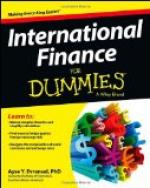Such being the terms of the loan we may be justified in supposing—if Ruritania has a clean record in its treatment of its creditors, and if the issuing firm is one that can be relied on to do all that can be done to safeguard their interests, that the loan is a complete success and is fully subscribed for by the public. The underwriters will consequently be relieved of all liability and will pocket their 2 per cent., which they have earned by guaranteeing the success of the issue. If some financial or political shock had occurred which made investors reluctant to put money into anything at the time when the prospectus appeared or suggested the likelihood that Ruritania might be involved in war, then the underwriters would have had to take up the greater part of the loan and pay for it out of their own pockets; and this is the risk for which they are given their commission. Ruritania will have got its money less the cost of underwriting, advertising, commissions, 1 per cent. stamp payable to the British Government, and the profit of the issuing firm. Some shipyard in the north will lay down a battleship and English shareholders and workmen will benefit by the contract, and the investors will have got well secured bonds paying them a good rate of interest and likely to be easily saleable in the market if the holders want to turn them into cash. The bonds will be large pieces of paper stating that they are 4-1/2 per cent, bonds of the Kingdom of Ruritania for L20, L100, L500 or L1000 as the case may be, and they will each have a sheet of coupons attached, that is, small pieces to be cut off and presented at the date of each interest payment; each one states the amount due each half year and the date when it will have to be met.




